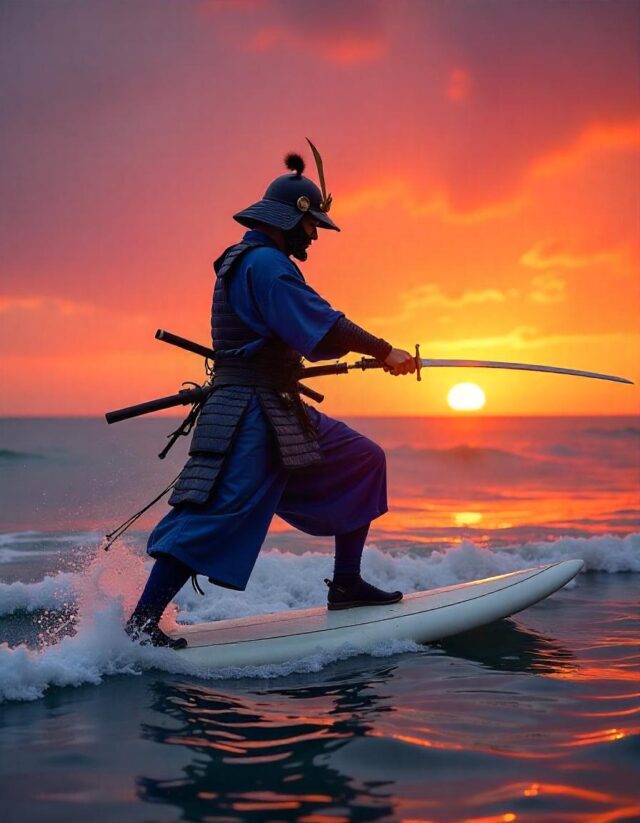
Introduction
Swordsmanship and surfing might seem worlds apart, but they share a surprising connection. Both require balance, focus, and a deep connection to the present moment. The samurai trained in the art of the sword not just for combat but also for personal discipline and spiritual growth. Surfing, although more laid-back, demands similar mental clarity and physical control.
In Florida, where the waves roll gently onto sandy shores and the ocean breeze invites relaxation, surfers often find peace and mindfulness. This state of calm mirrors the Zen-like focus that the samurai achieved through their training. Exploring the parallels between these two practices reveals how ancient samurai wisdom aligns with Florida’s coastal lifestyle.
The Way of the Samurai
Samurai swordsmanship was never just about mastering the blade. It was a path toward self-discipline and mental clarity. The samurai followed Bushidō (the “Way of the Warrior”), a code of conduct based on honor, loyalty, and self-control—training with a sword required technical skill and a strong mental presence.
A samurai approached combat with the same calm and precision expected daily. Sword training involved repetitive practice, often for hours, to develop muscle memory and instinctive reactions. The goal was to remain centered even in the face of danger. A distracted mind could mean defeat.
The samurai also incorporated Zen principles into their training. Meditation and breathing exercises helped them sharpen their focus and control their emotions. Drawing a sword (known as iaido) demanded complete concentration and fluid motion, like catching the perfect wave on a surfboard.
The mental and physical discipline practiced by the samurai remains relevant today. Modern martial artists continue to train with traditional swords to learn combat techniques and cultivate focus and inner peace.
The Art of Letting Go
Surfing, like swordsmanship, requires more than physical strength. It demands a calm and focused mind. With its consistent waves and warm waters, Florida’s coastline attracts surfers looking for adventure and relaxation.
Catching a wave requires perfect timing and balance. A surfer must anticipate the movement of the water, adjust their position, and commit to the ride. Overthinking or hesitation often leads to falling off the board. This moment-to-moment presence mirrors the focus a samurai needed when drawing and striking with a sword.
The ocean’s unpredictability teaches surfers to adapt and let go of control. A surfer can’t fight the wave—they must flow with it. Similarly, a samurai learned to respond to opponents’ movements without resistance. Success in both practices comes from working with natural forces rather than against them.
Surfing also encourages mindfulness. Paddling out into the water, feeling the rhythm of the waves, and waiting for the right swell creates a sense of connection with nature. This connection mirrors the Zen state that the samurai sought through their training.
Finding Zen in Motion
Both swordsmanship and surfing emphasize mindfulness in motion. The body and mind must work together, cutting through water or drawing a blade. Achieving this harmony requires discipline and practice.
A samurai’s training focused on efficiency and control. Surfing, although more fluid, involves similar precision. Breathing plays a key role in both practices. Samurai trained to control their breath during combat, and surfers rely on steady breathing to stay calm while paddling and to hold their breath when submerged.
A Perfect Balance of Discipline and Relaxation
The focus and control learned through swordsmanship can improve a surfer’s ability to remain calm and balanced. The relaxed, adaptable mindset gained from surfing can help martial artists respond more fluidly in training or competition.
In Florida, surfers often seek a balance between work and relaxation. The ocean offers a break from daily stress, while the physical challenge of surfing provides a sense of accomplishment. Samurai training offered a similar balance. The structure of Bushidō provided stability, while the mastery of the sword gave a sense of personal power and peace.
Training with a samurai sword can enhance this balance. Handling a katana requires patience and dedication but also creates a sense of calm and control. Reputable sources like www.samuraiswordstore.com offer authentic samurai swords and training resources for those interested in exploring traditional swordsmanship. Developing this skill can deepen the sense of focus and flow familiar to surfers.
Connecting Tradition and Modern Life
Modern life often pulls attention in multiple directions. Technology, social pressure, and daily stress create mental clutter, making it hard to focus. Both samurai training and surfing offer a way to disconnect from these distractions and reconnect with the present moment.
Sword training teaches focus and patience. Caring for a sword—cleaning the blade, wrapping the handle, and maintaining the edge—requires attention to detail and a quiet mind. Surfing demands a similar level of presence. A surfer must tune out distractions and respond only to the movement of the wave.
These practices also teach resilience. A samurai learned to face setbacks and defeat with dignity, knowing that growth came through persistence. Surfers experience this identical lesson when they wipe out repeatedly before mastering a wave. Success in both disciplines comes from staying calm, adjusting technique, and trying again.
Combining swordsmanship’s focused strength with the relaxed surfing flow creates a balanced mindset. This balance helps navigate not only physical challenges but also the mental demands of everyday life.
The Path to Zen
Zen philosophy emphasizes the importance of balance and presence. Samurai swordsmanship and surfing both reflect this idea. Success in both practices comes not from force but from harmony and flow.
Samurai training teaches the value of precision and calm in the face of challenge. Surfing teaches the importance of surrendering to natural forces and trusting instinct. Together, they offer a complete picture of balance—strength paired with adaptability, control balanced by release.
For Floridians, embracing this balance means more than just mastering a wave or a sword. It’s about approaching life with a calm focus and the ability to adapt. The ocean and the sword both teach the same lesson: true strength comes from inner peace and the ability to stay present in the moment.
Samurai training and surfing might seem unrelated, but they share a core philosophy of balance and mindfulness. Swordsmanship teaches focus, precision, and discipline, while surfing encourages adaptability and flow. Both practices require a calm mind and a strong body, working together perfectly.
Florida’s coastal lifestyle offers the perfect setting to explore this balance. Surfing provides an opportunity to connect with nature and find peace in motion. Sword training adds structure and mental clarity, helping to sharpen focus and build inner strength.
Exploring both practices creates a powerful combination of strength and calm. Whether on the waves or with a blade in hand, the path to Zen lies in the balance of discipline and flow.
Disclaimer
The information contained in South Florida Reporter is for general information purposes only.
The South Florida Reporter assumes no responsibility for errors or omissions in the contents of the Service.
In no event shall the South Florida Reporter be liable for any special, direct, indirect, consequential, or incidental damages or any damages whatsoever, whether in an action of contract, negligence or other tort, arising out of or in connection with the use of the Service or the contents of the Service. The Company reserves the right to make additions, deletions, or modifications to the contents of the Service at any time without prior notice.
The Company does not warrant that the Service is free of viruses or other harmful components












